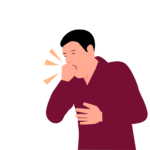BLOG
Understanding Influenza Transmission: How to Avoid Spreading the Flu
Influenza, commonly known as the flu, is a highly contagious viral respiratory illness. It is caused by influenza viruses, specifically types A, B, and C. Influenza A and B viruses are responsible for seasonal outbreaks of the flu, while influenza C viruses generally cause mild respiratory symptoms.
The flu is primarily transmitted through respiratory droplets when an infected person coughs, sneezes, or talks. It can also spread if you touch contaminated surfaces and then touch your eyes, mouth, or nose. The virus has a short incubation period of about 01 to 04 days.
The symptoms of influenza typically include body aches, cough, fatigue, fever, headache, runny or stuffy nose, sore throat, and sometimes gastrointestinal symptoms like diarrhea, nausea, and vomiting. In most healthy individuals, the flu is self-limiting and resolves within a week or two. However, certain populations, such as individuals with weakened immune systems, older adults, pregnant women and young children are at a higher risk of developing severe complications from the Influenza virus.

While it may be challenging to completely halt the transmission of influenza, there are certainly steps that you can take to protect yourself from becoming infected. You can do this by following these essential measures:
- Avoid touching your face
Try to refrain from touching your eyes, mouth, or nose as these areas are entry points for the flu virus.
- Clean and disinfect surfaces
Make sure to regularly clean and disinfect frequently-touched surfaces, such as countertops, doorknobs, electronic devices, and light switches. Use appropriate disinfectants that are effective against the influenza viruses.
- Dispose of tissues properly
After using tissues, make sure to dispose of them in a closed bin in order to minimize the risk of contamination.
- Get vaccinated
You must ensure that you receive the annual flu vaccine. Remember that vaccination is one of the most effective ways to protect yourself and reduce the spread of influenza.
- Maintain hand hygiene
Wash your hands frequently with soap and water for at least 20 seconds. If soap and water are unavailable, use an alcohol-based hand sanitizer with a minimum of 60% alcohol content.
- Practice good respiratory hygiene
Make sure to cover your mouth and nose with a tissue or your elbow when coughing or sneezing. This helps prevent respiratory droplets containing the virus from spreading to others.
- Practice respiratory etiquette
Encourage others to follow respiratory etiquette by covering their mouths and noses when coughing or sneezing. Spread awareness about the importance of these preventive measures.
- Stay home when sick
If you have flu-like symptoms, stay home from work, school, or social gatherings to prevent spreading the virus to others. Follow local guidelines regarding isolation and seeking medical care if necessary.
Remember, by taking these precautions, you play a vital role in preventing the transmission of the influenza flu to others. Stay informed, be proactive, and prioritize the health and well-being of yourself and those around you.












